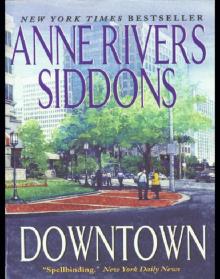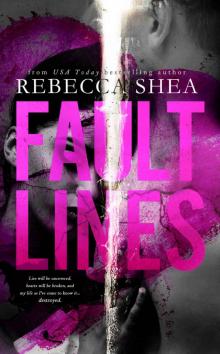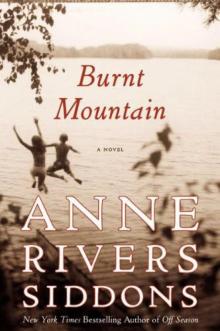- Home
- Anne Rivers Siddons
House Next Door Page 16
House Next Door Read online
Page 16
“I guess a lot of women do that, especially when they have to stay inside and rest and can’t go out.”
She looked past me at a robust, startlingly proportioned mural of the Bay of Naples. “Buck thinks she’s waiting to see…something else about the boy. She doesn’t say so of course, and he wouldn’t mention it, but she gets very querulous, very peevish, when he tries to turn the set off. He says she never cared for television before.”
“Don’t you think Buck might be overreacting?” I said. I was annoyed, but I did not know why. “Reading things into what she’s doing because he’s so afraid there will be something?”
“It’s possible. I suggested that, and he admits that he could be. But she says there have been some phone calls too.”
Dread brushed my heart. “Phone calls? From whom?”
“From nobody. I mean, she says the phone rings, and when she answers there’s nobody on the line.”
“Probably our friendly corner burglar trying to find out what her in-and-out patterns are. That happens to most of us sometimes, Virginia.”
“Well, she insists that these are long-distance.”
“How can she tell if there’s nobody on the line?”
“She says there’s that sort of faraway rushing sound, like you hear when a long distance call comes in, before anybody speaks.”
“Has Buck taken any of them?”
“She says they come during the day, when he’s at work. I don’t think there have been many of them, but they seem to upset her—out of all proportion.”
“I guess maybe they would, if you were sick and jumpy like she is.”
“She…Colquitt, she thinks it’s that woman.”
“What woman?” I said stupidly.
“That woman that Buck—you know, when he was drinking so, and she read that letter the woman had written him, and he found her there in that rocking chair—”
“Oh, God!” I moaned. “What did she say? Anita, I mean? Did she say she thought it was the woman?”
“No. She never did, directly. But Buck came in last week, one night late, and found her sitting in that rocking chair, the one that was in the boy’s room where he found her before. It’s that bentwood by the fireplace. She was just rocking, and rocking. And staring straight in front of her. The phone was on her lap; she was rocking it in her lap.”
“Ah, dear God, Virginia, she didn’t go off into another one of those awful things—”
“No, no, she didn’t. Nothing like that. He thought she had when he first came in, but she looked up quite matter-of-factly and said that there had been another of those long-distance phone calls where nobody was on the line.”
“That’s all she said about it?”
“That’s all.”
“Then why should either of you assume she thinks it’s the woman calling?”
“Well, it was so like that other time, the time that put her in the hospital, you see. The same chair. The rocking, the staring. And she’d just found out about the woman then.” Virginia frowned. “I know it sounds like a huge assumption, but when you hear Buck describe it, it sounds…plausible, somehow.”
“When did you hear him describe it?” I asked.
“He called me when it happened. I went over.” She finished her drink and looked around for the waiter. He appeared, and we ordered another Bloody Mary apiece.
“And what was she like? What was going on?”
“Nothing much was going on. She was still in the chair, but she was pleasant to me, just a little detached. She said she was sleepy and wanted to go to bed, and Buck took her upstairs. She did say one thing that just about broke my heart. She stopped on the bottom step and looked back at me, and said, ‘Can you ever really fix things that have been broken once? I thought you could, but I was crazy for a long time, you know.’”
“Oh, poor, poor thing! Poor Buck. Poor you, for that matter.”
“Well, it’s mainly Buck I’m worried about right now. He came back downstairs and talked to me for a long time—that’s when he told me about the TV watching and the phone calls—and I did tell him I thought he might be reading in things that simply weren’t there. But he was so worried that I finally insisted that he call her doctor.”
“And?”
“And the doctor said he didn’t much like the sound of it. He said at first he thought she might be better off hospitalized for a week or two, so they could do some really intensive therapy and keep her away from televisions and telephones, but Buck didn’t want to do that, and the doctor said she could stay home if there was somebody with her during the day, when Buck’s at work. He’s also seeing her every day now, and he’s got her on some stronger medication. Stelazine, or Thorazine, or something—one of the really strong tranquilizers. She’s been very calm since then of course, with all that gunk in her, and a little—distant. She doesn’t talk much. But she’s beginning to perk up some. She isn’t sleeping so much. She’s been reading a good bit for the last two days, and yesterday she washed her hair and let me set it. There haven’t been any more phone calls. The doctor said there was a good possibility that there never were any. I thought that too. She’s eating all right.”
“You’ve been over there with her all day every day?” I asked.
“Well, not all day. Buck goes in late, and comes home for lunch every day, and he gets home early every evening.”
“Virginia, it’s too much on you. You really should have let us know. I could have taken some time off. Claire would have been glad to come and spell you. This is just above and beyond the call.”
“She didn’t want any of you to know, not quite yet. Not until she’s better. She’s embarrassed and angry at herself and so anxious not to be a burden to anybody that it’s pitiful to watch. She’s really trying so hard to pull out of this thing, Colquitt. I never saw anybody fight so hard to be strong and well. She’s had such rotten bad luck since they came—”
“I know,” I said. “It’s almost macabre, the things that have been happening to her. Scary. It almost seems as if there’s some intelligence, or force, or something, that knows just what would hurt her most.” Faces swam before my eyes, flickered, and were gone: Walter’s, blind and alien, in a white light; Kim’s, rapt and incandescent. I took a long swallow of my drink.
Virginia looked at me severely. “You mustn’t let Anita’s illness get to you, Colquitt,” she said. “You’ve never been around mental illness before, have you? I have. My mother was hospitalized for years, off and on, with awful bouts of depression, only they didn’t know what to call it then, or how to treat it, really. It started after my brother was born. I know how it can affect you if you’re close to it. You lose your own perspective if you’re not careful. You have to keep telling yourself that it isn’t in the air, or due to some kind of force, or something—that it’s a concrete illness and it’s in them. Not in you. I got through mother’s, and I really think I’m a stronger person for it. I don’t mind staying with Anita, because I’ve been down that road before and I can keep my own wits and help her better than somebody who’s had no experience with this kind of thing. Like I said, we talk. I think she really does trust me. She’s just going to have to go through these ups and downs, and even if the things that have happened to her do seem particularly cruel, they’re natural, they’re explainable, in the light of her particular illness. They all could have happened to her anywhere, and probably would have.”
“You think that thing with the television set is explainable, then? You didn’t that morning.” Distress and the flickering image-faces of two men, quickly banished, made me harsher with Virginia than I have ever been.
“I was upset myself,” she said levelly. “I jumped to a conclusion that wasn’t logical; I saw something I was expecting to see. I don’t like to think of it myself, but I guess I can go just as temporarily bananas as the next person when the circumstances are right. Which they were that night, in spades. I want that thing forgotten; it isn’t important. What is is that An
ita does seem to be pulling out of it again, slowly, and that we all help her and support her in every way we can. Him too. It may be quite a long haul for her yet, and getting the willies over it ourselves is not what either of them needs.”
“You’re right,” I said. “You always are. I’m ashamed of myself. What can we do right now that will help? You can’t just devote your whole summer to baby-sitting with poor Anita Sheehan. Let some of us take a turn now.”
“No, really. Tomorrow’s my last day of duty, and I’ve had all of today off until four. Fanny went over today. Her cousin, the one whose family took her in after the accident, is coming down day after tomorrow to stay with her for a week or so, and by that time she may be able to stay alone. Or she may go home with her cousin for a little while. Buck doesn’t want her to do that; her doctor thinks she ought not to break treatment. But we’ll see how it goes. She told me that she didn’t mind if I told you and Claire about these past few days. She wanted me to, in fact, eventually. She wanted you both to know she’s not just ignoring you. But she really isn’t up to seeing you yet.”
I was obscurely and guiltily glad. We finished the drinks and ordered lunch and talked of other things. Eloise did indeed think she might be pregnant again, and we groaned and laughed a little over that.
“Somebody ought to tell Semmes what’s causing it,” Virginia said, and I laughed again, because it was as close to bawdiness as I have ever heard Virginia Guthrie come. She flushed a little and laughed with me.
“See what two drinks does to me?” she said. She looked incandescently beautiful and young in the plant-dappled sunlight of that restaurant window, with the shaded silver-gray strands of her hair loosened and curling around her face like dandelion fluff and the twin flags of liquor and laughter burning in her cheeks. Her image in that precise moment, in that particular noon, burned into my brain and has shimmered there ever since. I am terribly, terribly glad.
A letter came from Kim Dougherty that week. It was postmarked Rome. He didn’t say a great deal, and what he did say sounded determinedly cheerful and having-a-good-time-wish-you-were-here. But there was a restlessness to it too. He loved Italy, he said, and had been staying with friends of his parents in cities all through the country, and they had been kind and had shown him a royal good time. He had met a contessa, he said, who had a face like Rocky Marciano and wanted him to come and spend two or three months at her villa in Calabria to oversee some renovations, but he had, he said, a pretty good idea what she wanted to renovate and he didn’t think even an architect could help her there.
Walter and I laughed at that; it was a glimmer—just a glimmer—of the old Kim.
He said that he’d had about enough of the high life and that he thought he’d take off pretty soon on his own, with his backpack, or maybe by train or bus, and work his way up through Switzerland and into France, and stay a while in Paris.
“I’ll come back to Italy after that,” he wrote, “and catch up on some of the things I’ve been avoiding on purpose this time around. Everywhere you look here the architecture and the art just yell out to you. All those centuries, all those minds and hands. I can’t ignore it forever, even if I can’t do it anymore. I hope to spend a lot of time in Florence this fall and winter. I ought to be ready for it by then.
“I miss you both,” he finished. “I hope things are better there now.”
I folded the letter and set it aside. I knew that I had been expecting to hear that his travels had restored to him what had vanished into the red earth of the next-door lot. But it was not here in these scribbled, banal words, not on this grimy, flimsy paper. And I knew that it was not in him. Not yet. I had not thought about Kim much since he left, but I missed him suddenly and achingly, missed the gray eyes crinkling out of the brick tangle of beard and eyebrows, the tall, shambling figure, the sudden boy’s grin, the big, deft hands. My eyes prickled, then cleared.
“I hope things are better there now,” he had written.
I was glad, for the first time, that he was not here to see how things were.
15
ANITA SHEEHAN’S COUSIN was a larger, older, paler echo of Anita, with Anita’s graceful bones and sculpted face lying under drifts of excess flesh as if under snow.
“She looks like Anita melted,” Walter said when Buck had brought the cousin over to meet us shortly after she arrived and they had gone back to the house next door, where Anita lay dozing in her Stelazine peace.
“She seems like a thoroughly nice woman to me,” I said. “Brisk and warm and no nonsense about her. I get the idea she’s been a trifle annoyed with baby cousin all along for letting anything so trivial as catatonia, or whatever it was, get to her. I don’t mean that she’s unsympathetic; she of all people knows what Anita’s been through, right from the beginning, with her father and brother. But I think she may be just what Anita needs now. Maybe you’re right and everybody has been a little too indulgent with her. It’s hard not to be when you’re so close to the situation.”
“Buck seems relieved, at any rate.”
“Well, he’s been having an awful time too, don’t forget. There’s just a limit to what anybody can take. I’m sure he’s grateful to have somebody else besides poor Virginia worrying about Anita, at least during the daytime. He does have a business to run.”
“It’s always interested me,” Walter said, “the people who crack and the people who don’t. The exact same things have happened to him that have happened to her, except for the thing with her father and brother. He lost his only child too. But he didn’t end up in the funny farm. Granted, he had a bad time with the booze and the girl there for a while, but he pulled himself out of that. He got himself straightened out and her out of the hospital, and he got himself another job and found her a house down here and set her up in it, and he’s hanging in there. Seeing Duck Swanson that night must have been as bad for him as it was for her, and all this other stuff that’s set her off must have almost been worse for him, really, because he couldn’t prevent it. But he’s not back on the booze. He hasn’t run off with his secretary. I’ve often wondered if some people are just born weaker than others, flawed somehow.”
“Are you forgetting about that television movie and those phone calls?” I said. “Those things happened to her, not to him. There’s no telling how that horrible thing on television might have affected him if he’d seen it. Everybody has a last straw, Walter.”
“If there was a movie at all, Colquitt. That thing was part of her flaw, her weakness, don’t you see? Buck doesn’t see movies or get phone calls that aren’t there, because there’s something in him that’s going to hold together no matter what.”
“Or maybe it just isn’t his turn yet.”
“What do you mean?” he said, frowning.
“I mean that maybe whatever it is is going to get her first before it goes to work on him.” I had not known what I meant and was shocked and frightened at my own words.
He came over to where I was standing, in front of the mirror over my dressing table. He put his arms around me and rested his chin on the top of my head. In the mirror I could see his face above mine. His eyes were closed and there was fatigue and distress in the lines around his mouth and eyes. My heart squeezed with love and remorse. Those lines had not been nearly so deep the last time I had really looked at Walter. When, in the past dizzying spring and summer, had they deepened? What betrayals, what self-indulgent dreads and fancies of mine had helped etch them there?
“Colquitt, when you talk like that I get the worst feeling in the pit of my stomach. I feel like I’m losing you to something I can’t fight or even see. I feel like you’re going away someplace where I can’t follow and leaving me alone. Please don’t do this to me. Please don’t talk like that anymore. That isn’t you talking. I want you back, baby. That’s all in the world I do want.”
“You almost lost me for good one night not so long ago,” I said, unable to stop the spiraling fright. “We almost lost each other for good.
Don’t you remember that? Don’t you remember where it happened?”
His face twisted with pain and a terrible, lost grief.
“Oh, darling, I’m so sorry,” I said, and began to cry with shame and love. “I’ve been so terribly damned selfish, with all this stupid apprehension and these childish things I’ve been thinking. I know you didn’t—I know you wouldn’t have—please, please forgive me. I just let myself go and rattle on and on and never stop to think how you must feel when I do. I won’t talk about it anymore. I won’t do it ever again. I won’t even think about it. You’re not losing me; there’s nothing in the world that could make that happen.”
In the cool, summer-night sweetness of the tangled bed we forgot it all for a time, and I remember thinking, just before I fell asleep in the lightly sweated curve of Walter’s arm, that this was what we were all about, this was the sum of us, and as long as there was this, nothing else mattered in any basic, bone-deep way. I slid into sleep on a tide of lightness and peace.
Marguerite Condon, Anita’s cousin, lived up to our first impression of her. She turned the house inside out in a flurry of cleaning and polishing and waxing. Virginia Guthrie lent her cleaning woman for the first three days of Marguerite’s stay, and the hum of the vacuum cleaner and the cheerful chuckle of the washing machine in the basement sang through the heat-heavy air in the mornings, even before I left for work.
In the afternoons, toward the last week of her initial stay in the house, she would get Anita up and dressed, and they would walk together in the backyard or as far as the mailbox and back again. Anita looked to me, the first time I saw her walking with her cousin, like a placid animal docilely following at the end of a leash. She was cave-pale, and her tan had faded, and her hair was awkwardly grown out but neatly caught at the back of her neck with a scarf, and her slacks and shirt were immaculate. She smiled at me and said, “Hello, Colquitt, how have you been?” and I said, “Just fine. It’s good to see you out again.”

 Colony
Colony Nora, Nora
Nora, Nora House Next Door
House Next Door Homeplace
Homeplace Downtown
Downtown Peachtree Road
Peachtree Road Sweetwater Creek
Sweetwater Creek Fault Lines
Fault Lines Low Country
Low Country The Girls of August
The Girls of August Burnt Mountain
Burnt Mountain Islands
Islands